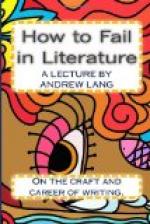To the enormous majority of persons who risk themselves in literature, not even the smallest measure of success can fall. They had better take to some other profession as quickly as may be, they are only making a sure thing of disappointment, only crowding the narrow gates of fortune and fame. Yet there are others to whom success, though easily within their reach, does not seem a thing to be grasped at. Of two such, the pathetic story may be read, in the Memoir of A Scotch Probationer, Mr. Thomas Davidson, who died young, an unplaced Minister of the United Presbyterian Church, in 1869. He died young, unaccepted by the world, unheard of, uncomplaining, soon after writing his latest song on the first grey hairs of the lady whom he loved. And she, Miss Alison Dunlop, died also, a year ago, leaving a little work newly published, Anent Old Edinburgh, in which is briefly told the story of her life. There can hardly be a true tale more brave and honourable, for those two were eminently qualified to shine, with a clear and modest radiance, in letters. Both had a touch of poetry, Mr. Davidson left a few genuine poems, both had humour, knowledge, patience, industry, and literary conscientiousness. No success came to them, they did not even seek it, though it was easily within the reach of their powers. Yet none can call them failures, leaving, as they did, the fragrance of honourable and uncomplaining lives, and such brief records of these as to delight, and console and encourage us all. They bequeath to us the spectacle of a real triumph far beyond the petty gains of money or of applause, the spectacle of lives made happy by literature, unvexed by notoriety, unfretted by envy. What we call success could never have yielded them so much, for the ways of authorship are dusty and stony, and the stones are only too handy for throwing at the few that, deservedly or undeservedly, make a name, and therewith about one-tenth of the wealth which is ungrudged to physicians, or barristers, or stock-brokers, or dentists, or electricians. If literature and occupation with letters were not its own reward, truly they who seem to succeed might




